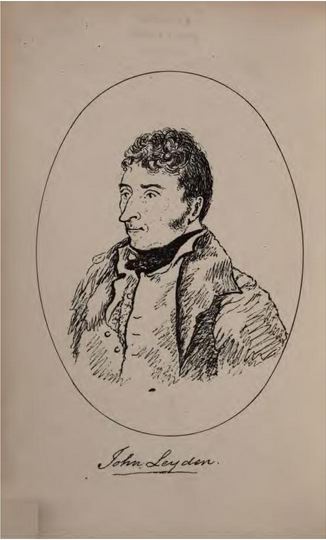John Leyden
John Leyden (1775-1811)
John Leyden was born and baptised in Denholm on the 8th September 1775, the son of John Leyden and Isabella Scott. He spent his early childhood at the farm of Nether Tofts, Henlawshiel, near Ruberslaw, where he was taught to read by his grandmother and attended the parish school of Kirkton from the age of nine. In 1788, at the age of twelve, Leyden was placed under the tuition of the Cameronian pastor Reverend James Duncan, from whom he learned Latin and some Greek.
 From 1790 to 1797 Leyden studied Divinity at the University of Edinburgh. Here he attracted attention for his strong accent and unconventional appearance whilst also distinguishing himself as a student, forging for himself a reputation as a versatile scholar and befriending the likes of John Murray, William Erskine and Thomas Brown. In the winter of 1793 he was introduced to the literary scholar and biographer Robert Anderson, through whom Leyden had his first poems published in the Edinburgh Literary Magazine in April 1795. Over the next few years, Leyden continued to study and write poetry. He attended his first medical classes in late 1796 or early 1797, and in the summer of 1797 embarked upon a walking tour of the Borders and the north of England alongside George Dyer. It was during this excursion that the poems “Scotish Music, an Ode” and “Ode on Visiting Flodden” were composed. In 1798, Leyden received a licence to preach from the Presbytery of St Andrews, but was unsuccessful in finding a living with the church.
From 1790 to 1797 Leyden studied Divinity at the University of Edinburgh. Here he attracted attention for his strong accent and unconventional appearance whilst also distinguishing himself as a student, forging for himself a reputation as a versatile scholar and befriending the likes of John Murray, William Erskine and Thomas Brown. In the winter of 1793 he was introduced to the literary scholar and biographer Robert Anderson, through whom Leyden had his first poems published in the Edinburgh Literary Magazine in April 1795. Over the next few years, Leyden continued to study and write poetry. He attended his first medical classes in late 1796 or early 1797, and in the summer of 1797 embarked upon a walking tour of the Borders and the north of England alongside George Dyer. It was during this excursion that the poems “Scotish Music, an Ode” and “Ode on Visiting Flodden” were composed. In 1798, Leyden received a licence to preach from the Presbytery of St Andrews, but was unsuccessful in finding a living with the church.
Although anecdotal accounts state that it was whilst browsing in Archibald Constable’s book shop in 1799, Leyden met the English book collector Richard Heber, it was in fact the editor and critic Robert Anderson,who introduced Richard Heber to Leyden. Heber subsequently introduced Leyden to Walter Scott in the Autumn of that year, and over the next three years Scott and Leyden worked together in preparing the first two volumes of the Minstrelsy of the Scottish Border for print. During this time Leyden obtained the Glenriddell Manuscript from a bookseller in Carlisle in June 1800 and in October returned from travelling in the Highlands and the Western Isles where he had been inspired to write “The Mermaid.” In 1801, the publication of Matthew Gregory Lewis’s Tales of Wonder contained Leyden’s “Elfin King” and his edition of the Complaynt of Scotland was published in December, 1801. As work on the Minstrelsy drew to a close in January 1802, Leyden decided to complete his medical studies as the only post available with the East India Company was that of a physician. In February, the Minstrelsy was published, officially acknowledging Leyden as the author of “Scotish Music, An Ode”, “Ode on Visiting Flodden”, “Lord Soulis” and “The Cout of Keeldar”. (“The Mermaid” was added to the second edition of 1803.)
By August 1802, Leyden had obtained his medical degree from the University of St Andrews. He left Scotland for London in December, the same month as his edition of Scotish Descriptive Poems was published. After spending some months with the retired diplomat George Ellis and his wife, Leyden sailed from Portsmouth to Madras, India, in August 1803 with his companion Hugh Inglis. His departure coincided with the publication of his poem Scenes of Infancy.
From 1803 to 1811, Leyden pursued a highly successful career as an orientalist and linguist with the East India Company. However, the risk of disease was high and Leyden’s early death at Cornelies, Batavia, on 28th August 1811 was the result of a fever contracted in an unventilated library.
Leyden’s death was mourned by his contemporaries, and he was commemorated by various literary figures of the time including Walter Scott, William Erskine and James Hogg. Writing in the anonymous “Biographical Memoir of John Leyden” in 1813, Scott officially acknowledged Leyden as the author of the Minstrelsy’s “Essay on the Fairies of Popular Superstition” and depicted a highly eccentric caricature of his friend. In 1861 a monument to Leyden’s memory was erected in Denholm, funded by public subscription.